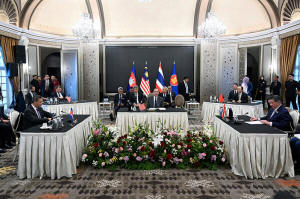Thailand and Cambodia agree to 'immediate and unconditional' ceasefire,
Malaysian PM says
[July 28, 2025]
By EILEEN NG, JINTAMAS SAKSORNCHAI and SOPHENG CHEANG
PUTRAJAYA, Malaysia (AP) — Thailand and Cambodia have agreed to an
“immediate and unconditional” ceasefire from midnight to resolve deadly
border clashes, Malaysian Prime Minister Anwar Ibrahim said Monday.
Anwar, who chaired the talks as head of the ASEAN regional bloc, said
both sides have reached a common understanding to take steps to return
to normalcy.
Cambodian Prime Minister Hun Manet and Thai Acting Prime Minister
Phumtham Wechayachai have agreed to “an immediate and unconditional
ceasefire with effect from... midnight of 28 July,” Anwar said as he
read out a joint statement.
Hun Manet and Phuntam hailed the outcome of the meeting and shook hands
at the conclusion of the brief press conference.
THIS IS A BREAKING NEWS UPDATE. AP’s earlier story follows below.
KUALA LUMPUR, Malaysia (AP) — Ceasefire talks have started between Thai
and Cambodian leaders in Malaysia in an urgent effort to resolve deadly
border clashes that entered a fifth day despite mounting international
calls for peace.
Cambodian Prime Minister Hun Manet and Thai Acting Prime Minister
Phumtham Wechayachai gathered Monday for the meeting at the official
residence of Malaysian Prime Minister Anwar Ibrahim who is hosting the
negotiations as chair of the regional bloc, Association of Southeast
Asian Nations.
The fighting flared last Thursday after a land mine explosion along the
border wounded five Thai soldiers. Both sides blamed each other for
starting the clashes, that have killed at least 35 people and displaced
more than 260,000 people on both sides. Both countries recalled their
ambassadors and Thailand shut all border crossings with Cambodia, with
an exception for migrant Cambodian workers returning home.

Troops from both sides reported ongoing fighting Monday along border
areas. Gunfire could be heard as dawn broke in Samrong in Cambodia's
Oddar Meanchey province, Associated Press reporters covering the
conflict said.
Maly Socheata, a Cambodian defense ministry spokesperson, said the Thai
assault was “ongoing and strong” on Monday.
Anwar said late Sunday that both sides would present their conditions
for peace but “what is important is immediate ceasefire.”
“I hope this can work,” Anwar was quoted as saying by Malaysian national
news agency Bernama. “Although it’s not as bad as many other countries,
we have to put a stop (to the violence).”
The meeting followed direct pressure from U.S. President Donald Trump,
who has warned that the United States may not proceed with trade deals
with either country if hostilities continue.
Before departing for Kuala Lumpur, Phumtham told reporters in Bangkok
that representatives from China and the U.S. will also attend as
observers. He said the key focus would be on an immediate ceasefire, but
noted trust could be an issue as Cambodia has not stopped its strikes.
“We have informed that we don’t have trust in Cambodia. All they have
done reflect that they are not sincere in solving this problem. So they
have to show the detail how they will do to prove their sincerity,” he
said.
[to top of second column]
|

Malaysia's Prime Minister Anwar Ibrahim, center, looks on as
Cambodia's Prime Minister Hun Manet, left, and Thailand's acting
Prime Minister Phumtham Wechayachai, right, take part in talks on a
possible ceasefire between Thailand and Cambodia, in Putrajaya
Monday, July 28, 2025. (Mohd Rasfan/Pool Photo via AP)

Officials later said that the Chinese and American ambassadors to
Malaysia are attending the meeting.
The violence marks a rare instance of open military confrontation
between ASEAN member states, a 10-nation regional bloc that has
prided itself on non-aggression, peaceful dialogue and economic
cooperation.
In a statement Monday, ASEAN foreign ministers reiterated concern
over the rising death toll, destruction of public properties and
displacement of a large number of people along the disputed border
areas. They urged the two countries to resolve their disputes
through negotiations and expressed support for efforts to find a
middle ground during Monday’s talks.
The conflict also drew the attention of Pope Leo XIV. At the Vatican
on Sunday, the pontiff said he was praying for all those affected by
war in the world, including “for those affected by the clashes on
the border between Thailand and Cambodia, especially the children
and displaced families.”
At an evacuation shelter in Cambodia's Siem Reap province far away
from the border, Ron Mao, 56, prays for a ceasefire deal during the
leaders' meeting Monday. She and her family fled their home a
kilometer (0.6 mile) away from the front line when fighting broke
out Thursday. They took refuge in a shelter but moved again to
another camp further away after hearing artillery shelling.
“I don’t want to see this war happen. It’s very difficult and I
don’t want to run around like this,” she said, “When I heard our
Prime Minister go to negotiate for peace, I would be very happy if
they reached the deal as soon as possible, so that I and my children
can return home as soon as possible."
Thai evacuees shared the sentiment.
“I beg the government. I want it to end quickly," said farmer Nakorn
Jomkamsing at an evacuation camp in Surin hosting more than 6,000
people. "I want to live peacefully. I miss my home, my pets, my
pigs, dogs and chicken,” the 63-year-old woman said.
The 800-kilometer (500-mile) frontier between Thailand and Cambodia
has been disputed for decades, but past confrontations have been
limited and brief. The latest tensions erupted in May when a
Cambodian soldier was killed in a confrontation that created a
diplomatic rift and roiled Thailand’s domestic politics.
________
Jintamas reported from Surin, Thailand, and Sopheng Cheang from
Samrong, Cambodia. Associated Press writers Chalida
Ekvitthayavechnukul and Grant Peck in Bangkok contributed to this
report.
All contents © copyright 2025 Associated Press. All rights reserved
 |